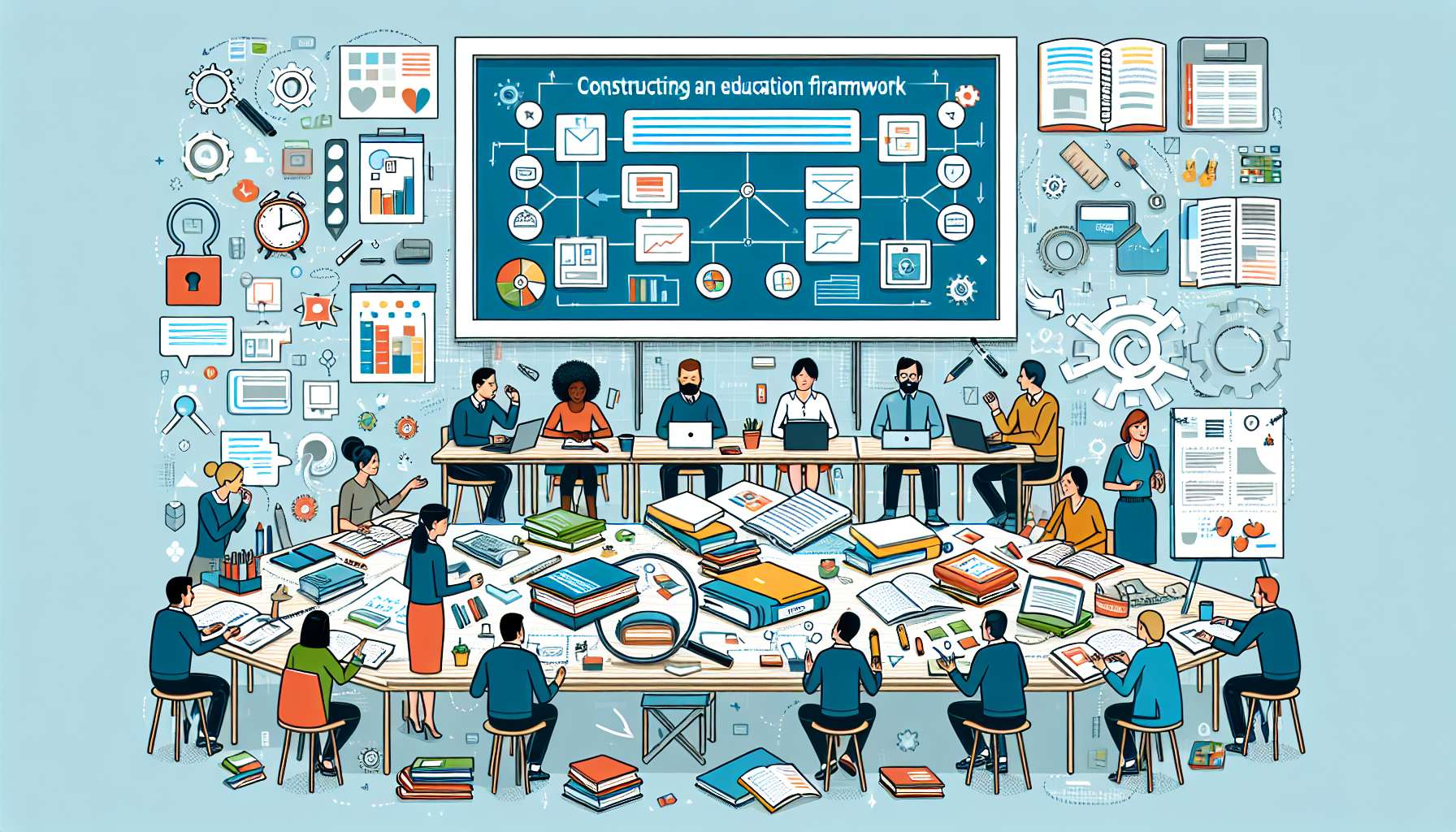Educational Framework Essentials: A Comprehensive Guide
Education is the cornerstone of society, shaping minds, fostering growth, and paving the way for a brighter future. At the heart of every successful educational system lies a robust framework that guides teaching, learning, and assessment practices. Educational frameworks serve as blueprints for educators, policymakers, and stakeholders, ensuring that students receive a well-rounded and effective education. In this article, we delve deep into the essentials of educational frameworks, exploring their significance, components, and impact on the educational landscape. Join us on this enlightening journey as we uncover the key elements that make up this critical aspect of education.
The Foundation of Educational Frameworks
At the core of any educational framework is a set of guiding principles that define the goals, objectives, and standards of education. These principles serve as the foundation upon which the entire educational system is built, providing a clear direction for educators and students alike. Whether it’s a national curriculum framework, a school-based framework, or a specialized framework for a particular subject or grade level, these guiding principles play a crucial role in shaping the learning experience. For example, the Common Core State Standards in the United States outline the essential knowledge and skills that students should acquire at each grade level, providing a roadmap for educators to design their curriculum and instructional practices.
One of the key components of educational frameworks is alignment. Alignment ensures that all aspects of the educational system, from curriculum to assessment to instruction, are working together towards a common goal. When there is alignment between these components, students are more likely to achieve academic success and develop the necessary skills for the future. For instance, if a curriculum framework emphasizes critical thinking skills, assessments should be designed to measure students’ ability to think critically, and teachers should be trained to incorporate critical thinking strategies into their instruction.

The Role of Standards in Educational Frameworks
Standards are an integral part of educational frameworks, providing benchmarks for what students should know and be able to do at each grade level. These standards articulate the learning goals and objectives that educators should strive to achieve, guiding the development of curriculum, assessments, and instructional practices. Standards can be subject-specific, such as the Next Generation Science Standards, which outline the science content and practices that students should master, or cross-curricular, like the 21st Century Skills framework, which focuses on essential skills such as communication, collaboration, and critical thinking.
Standards also play a vital role in promoting equity and access in education. By setting clear expectations for student learning, standards help ensure that all students, regardless of background or ability, have the opportunity to receive a high-quality education. When educators align their instruction with standards, they are better able to meet the diverse needs of their students and provide them with the support and resources they need to succeed.
Assessment and Evaluation in Educational Frameworks
Assessment is a critical component of educational frameworks, providing feedback on student learning and informing instructional decisions. Assessments can take many forms, including standardized tests, performance tasks, portfolios, and observations, each serving a unique purpose in gauging student progress and understanding. When assessments are aligned with the goals and objectives of the educational framework, they can provide valuable insights into student learning and help educators identify areas where additional support may be needed.
Evaluation is another key aspect of educational frameworks, allowing educators to assess the effectiveness of their instructional practices and make data-driven decisions to improve student outcomes. By collecting and analyzing data on student performance, teacher effectiveness, and school-wide initiatives, educators can identify areas of strength and weakness within the educational system and implement targeted interventions to address any issues that may arise.

Technology Integration in Educational Frameworks
In today’s digital age, technology plays a significant role in shaping educational frameworks and practices. Technology integration in education has the potential to enhance teaching and learning, engage students in new and innovative ways, and prepare them for success in the digital world. Educational frameworks that incorporate technology standards and guidelines help educators leverage technology tools and resources to create interactive and personalized learning experiences for students.
From online learning platforms and interactive whiteboards to virtual reality and artificial intelligence, technology offers a wealth of opportunities for educators to enhance their instructional practices and meet the diverse needs of their students. By integrating technology into the educational framework, schools can create a more dynamic and engaging learning environment that prepares students for the challenges and opportunities of the 21st century.
Professional Development and Support in Educational Frameworks
Professional development is essential for educators to stay current with best practices, trends, and research in education. Educational frameworks that prioritize professional development and support for teachers help ensure that educators have the knowledge, skills, and resources they need to deliver high-quality instruction and support student learning. Professional development opportunities can take many forms, including workshops, conferences, online courses, mentoring programs, and collaborative learning communities.
Support for educators goes beyond professional development and includes access to resources, technology tools, and ongoing feedback and evaluation. When educators feel supported in their work, they are more likely to be engaged, motivated, and effective in their teaching practices, which ultimately benefits student learning and achievement. Educational frameworks that prioritize professional development and support for educators create a positive and nurturing environment for teaching and learning.
Global Perspectives in Educational Frameworks
As the world becomes increasingly interconnected, global perspectives are gaining importance in educational frameworks. Global education aims to foster awareness, understanding, and appreciation of diverse cultures, perspectives, and world issues, preparing students to be responsible global citizens. Educational frameworks that incorporate global perspectives help students develop empathy, cultural competence, and a sense of social responsibility, essential skills for success in today’s globalized world.
From multicultural literature and global citizenship education to virtual exchanges and service-learning projects, there are many ways to integrate global perspectives into the educational framework. By exposing students to different cultures, languages, and worldviews, educators can help them develop a broad and inclusive perspective on the world and become agents of positive change in their communities and beyond.
Expert Opinions on Educational Framework Essentials
According to Dr. John Hattie, renowned education researcher and author of “Visible Learning,” educational frameworks are essential for ensuring that all students have access to high-quality education. He emphasizes the importance of setting clear learning goals and standards, aligning curriculum and instruction with those standards, and providing timely feedback and support for student learning. Dr. Hattie believes that educational frameworks can help educators identify areas of improvement and implement evidence-based practices to enhance student outcomes.
Dr. Linda Darling-Hammond, president of the Learning Policy Institute, highlights the role of educational frameworks in promoting equity and excellence in education. She emphasizes the importance of providing all students, regardless of background or ability, with access to a rigorous and engaging curriculum that meets their individual needs. Dr. Darling-Hammond believes that educational frameworks should prioritize personalized learning, culturally responsive teaching practices, and support for social and emotional development to ensure that every student has the opportunity to succeed.
Common Misconceptions about Educational Frameworks
One common misconception about educational frameworks is that they stifle creativity and innovation in the classroom. While it’s true that frameworks provide structure and guidelines for teaching and learning, they also allow for flexibility and customization to meet the diverse needs of students. Educators have the freedom to adapt and modify the framework to best suit their students’ learning styles, interests, and abilities, fostering creativity and innovation in the classroom.
Another misconception is that educational frameworks are one-size-fits-all solutions that do not account for the unique needs of individual students. In reality, educational frameworks are designed to be adaptable and responsive to the needs of diverse learners, providing a framework for educators to differentiate instruction, provide targeted support, and create inclusive learning environments. By incorporating principles of universal design for learning and culturally responsive teaching, educators can ensure that all students have the opportunity to succeed within the framework.
Conclusion
To wrap things up, educational frameworks are essential components of the educational system, providing a roadmap for teaching, learning, and assessment practices. By setting clear goals, standards, and expectations, frameworks help educators align their instruction with the needs of students, promote equity and excellence in education, and prepare students for success in the 21st century. As we continue to navigate the complex landscape of education, it’s important to recognize the value of educational frameworks and their role in shaping the future of learning. Let’s embrace the essentials of educational frameworks and work together to create a more inclusive, engaging, and effective educational experience for all students.




